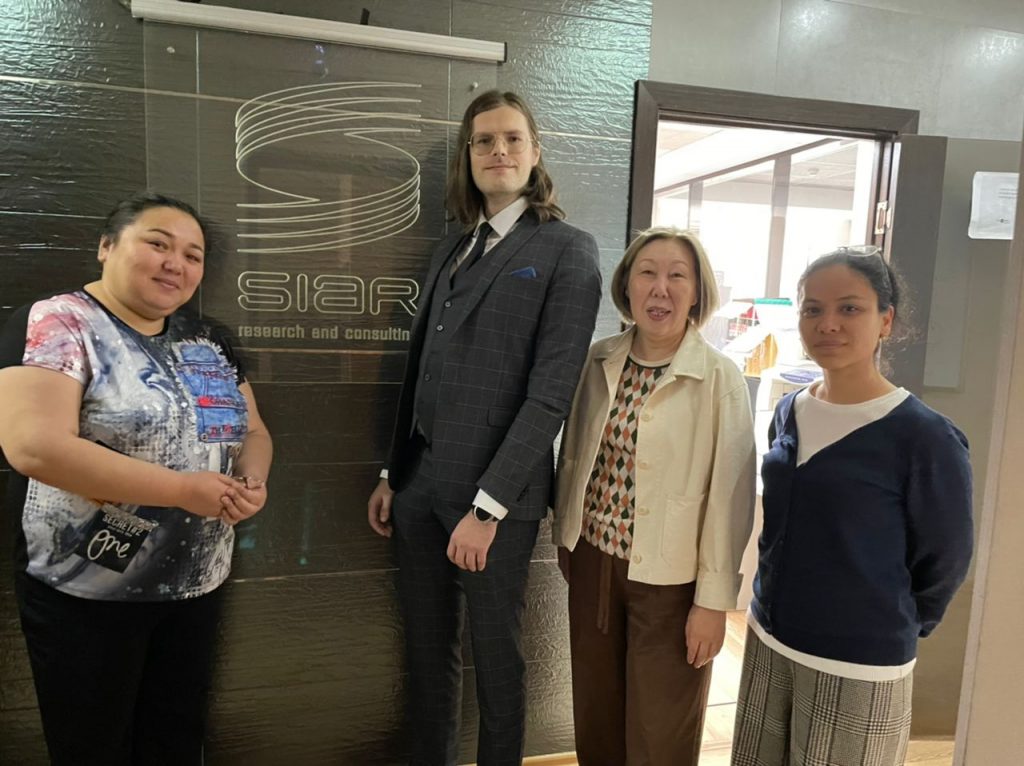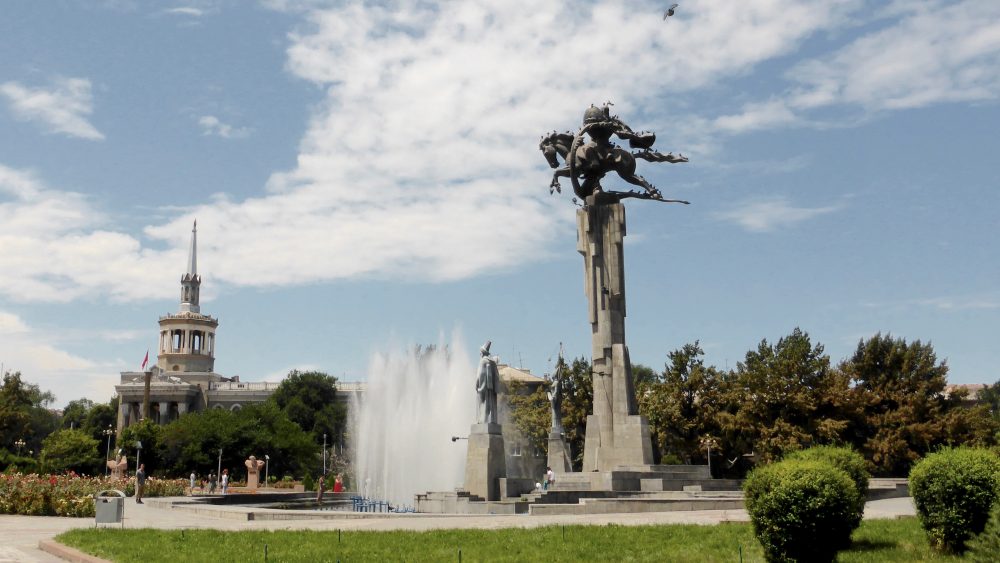by Krists Ansons, PhD candidate at the University of Latvia
I am Krists Ansons and I am a PhD student at the University of Latvia. In Kyrgyzstan my hosting institution was LLC “SIAR research&consulting” which helped me with my research, information gathering and even gave general advice on living in Kyrgyzstan. I work in international tax law, transfer pricing and in my daily work specialize in conclusion of advance pricing arrangements and solving mutual agreement procedures. So far, I have lived for 6 months in Kyrgyzstan, from middle of April 2022 until now, end of September 2022. Central Asian Law project is relevant to me in three ways – personally, professionally and academically. But for the sake of convenience, I will start with my personal experience in Kyrgyzstan so far.
Central Asian Law project is relevant to me personally, as applying to this project provided me with a wonderful opportunity to widen my point of view and improve my knowledge of inter culture business relations. During this project I realized, that Kyrgyzstan, is a very accessible country for tourists. For example, I, as a citizen of an EU state, could come to Kyrgyzstan without a visa, and I could stay there for up to two months per visit. Furthermore, it was possible to cross the border and come back, to extend the visit. This lack of required formalities was refreshing, as my trip required almost no bureaucracy. As there were no direct flights from Latvia to Kyrgyzstan, I opted a flight from Riga to Bishkek (the capital of Kyrgyzstan) with transfer in Istanbul (Turkish Airlines) the total time spent on the flights was around 9 hours, so upon arrival I was pretty tired. My first impression started with the look from the airplane window to the Manas international airport, which from above resembled more of a military base. Yet from the inside it looked like a typical airport, with check of passport, and scan of baggage, and some available shops. I recommend everyone upon arrival, if you want to use internet and order a taxi in the city, to buy a Kyrgyz sim card in the airport, as it is very easy to do, so as no formalities are required. Furthermore, it is cheap. For around 10 dollars it is possible to buy a local sim card with unlimited internet for a month.

My second impression was exiting the airport, as outside I was greeted by numerous taxi drivers offering a fare, which came as a complete surprise to me, as so far the airport was a quiet, calm and orderly place – yet at the door, there was a crowd waiting. My hotel had already arranged a transfer there, so I went past without taking their services. Speaking about driving, Kyrgyz drivers tend to drive dangerously, but confidently, as few people follow the road rules. Most of the people in Kyrgyzstan are Muslim, but Kyrgyzstan is a secular country, therefore religion is separated from the state. In Kyrgyzstan, there are two official languages the Kyrgyz language and Russian. As I had learned Russian at school, I could use it comfortably to get around, but in day-to-day life English is used rarely, most receptionists in hotels and servers in restaurants knew it, but you should not expect everyone here to know it as English language is not a mandatory subject in their education system. Regarding the food, almost all the dishes in Kyrgyzstan are prepared from meat products.
The country itself is gorgeous, I visited the Kyrgyzstan capital Bishkek and so-called southern capital Osh. In these cities you can quite easily rent an apartment or a room in hotel using booking.com, Airbnb and other sites. I also visited Issyk-Kul lake, which is one of the largest mountain lakes in the world. In between these locations I saw beautiful mountains (80% of the country is covered in mountains), where the locals had set up their summer yurts and set up their flocks of horses, sheep and other animals to graze. I also saw roadside cafes, roadside mosques and other smaller and bigger cities. I also tried my hand at riding a horse for the first time in here. Summer here is hot, the temperature can reach above 35C degrees, yet the mountains are cool. Even in the middle of summer the people living in their summer yurts were dressed warm.
It was easy to live in Bishkek as money exchanges, shops, taxis and ATMs are everywhere. Regardless if you like to bargain or not, I recommend to visit the eastern style bazaars, as there you can buy almost everything while getting to know a little bit of the people’s mentality. I liked living there, and really felt myself at home, as everything a remote worker may need is there, also the cost of products, transport and services is significantly lower than in other countries.
Therefore, I can conclude that having the suffix “stan” and formerly being in the Soviet Union does not necessarily mean that there would be any obstacles for tourism and daily living.
Central Asian Law project is relevant to me professionally, as Central Asian countries, including Kyrgyzstan, are one of the priority cooperation partners of Latvia’s development cooperation policy. Furthermore, Kyrgyzstan has concluded Treaty for the avoidance of double taxation with Latvia which entered in force on 04.03.2008. Therefore, there is a basis for substantial level of economic cooperation between Latvia and Kyrgyzstan, if there is demand and supply. According to the central statistics bureau of Latvia, for the 2021. financial reporting year companies from Republic of Latvia exported goods to Kyrgyzstan in the value of 7 million EUR (mainly food products, canned sardines, canned mackerel, malt beer, medicine), and imported goods from Kyrgyzstan in the value of 600 000 EUR (mainly metals and its products). Imports from Kyrgyzstan to Latvia used to be roughly 3 times higher, but starting from 2020 financial reporting year Kyrgyzstan has decreased export of ore and precious metals, that used to make up the bulk of the imports to Latvia.
Central Asian Law project is relevant to me academically, as my thesis is on “the importance of international mutual agreement procedures in tax cases”. Taxes are the basis of the jurisdiction’s existence as the payment of taxes is part of a public contract (for example, constitution) between citizens or residents, and the jurisdiction. My thesis is linked with international taxation, which is relevant when a person or business is subject to the tax laws of different jurisdictions. With the development of technology, for companies and individuals, the place of performing economic activity and its auxiliary activities is no longer so important, hence person or business might be subject to the tax laws of different jurisdictions. Each jurisdiction has built their tax system based on their own policies and definitions which are not always coordinated with the other jurisdictions. The concluded Treaties for the avoidance of double taxation works to align the taxing rights of jurisdictions when there is an international element, that is in case when double taxation might occur, when it has occurred, or when it will occur. Double taxation is a restriction on property rights where the same profits are taxed twice. Tax law distinguishes between two types of double taxation: legal double taxation (the same income of one taxpayer is taxed in several countries), economic double taxation (the same income of two different taxpayers is taxed in the same country). It goes without saying that in this age of globalization there should be a right not to be taxed twice for the same income, therefore an instrument is necessary to prevent this situation. This instrument is tax conventions which contain mechanisms that prevent double taxation. Mutual agreement procedures are one of the instruments, when the normal application of the treaty norms has not resulted in solving the double taxation case. According to the treaty the tax payer can ask for the states to initiate this mutual agreement procedure to solve the double taxation case.
My task as a researcher within the scope of the Central Asian Law project was to find out how Kyrgyzstan has implemented the 25th paragraph (mutual agreement procedures) of the Model Tax Convention on Income and on Capital in their 30 concluded treaties for the avoidance of double taxation with the purpose of finding out if any changes would be necessary for them to align with the latest OECD recommendations and minimum standards. My other task was to find out how and if the 25th paragraph is applied in practice. These tasks are relevant as functional mutual agreement procedure regulation helps prevent double taxation, therefore making the jurisdiction better target for international businesses and investments.
Regarding these tasks I will publish the results in my paper as I finish my work within the Central Asian Law project.

